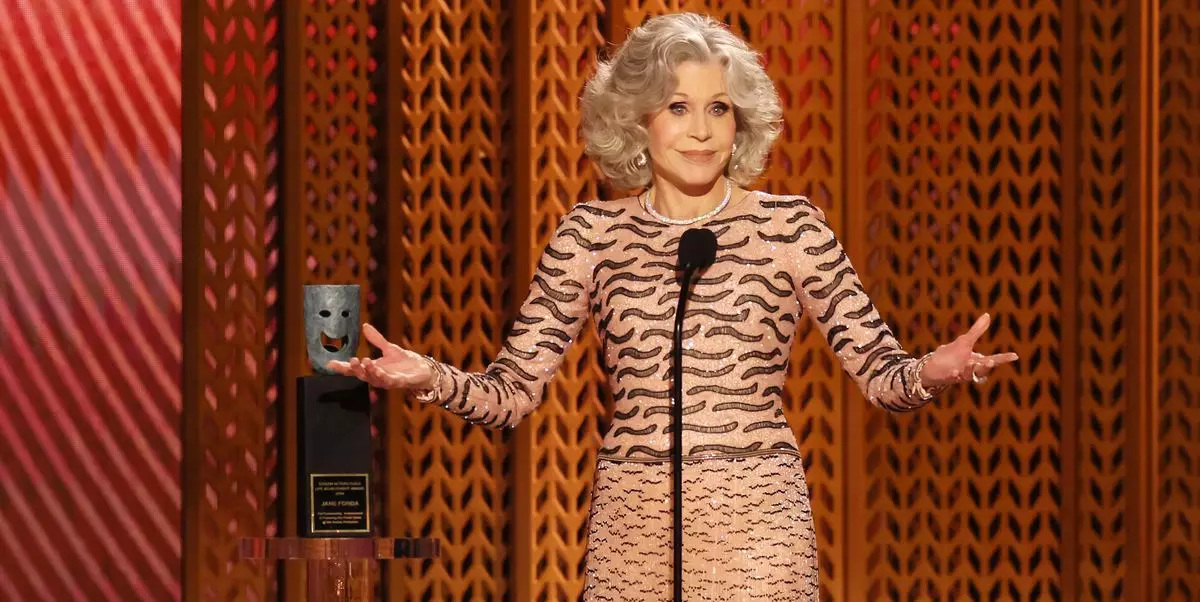At the recent Screen Actors Guild (SAG) Awards, Jane Fonda was honored with the prestigious 60th Life Achievement Award, a moment that resonated deeply with an audience eager to celebrate not just her remarkable career, but also her unwavering spirit. As the clapping crescendoed, Fonda took the stage, exuding a fiery energy that belied her 87 years. “Your enthusiasm makes this seem less like a twilight of my life and more like a, ‘Go girl, kick ass!'” she proclaimed. This declaration was more than just a catchphrase; it was a rallying cry that urged everyone in the room—and beyond—to embrace tenacity and resilience at any age. Fonda is evidently not ready to step away from the limelight, embodying a “late bloomer” narrative with grace and humor.
In an industry that often diminishes the achievements of older women, Fonda’s journey is a testament to the power of persistence. After taking a hiatus, she made a stunning return to acting at 65, later starring in a successful film in her 80s. Her lighthearted remark about potentially performing her own stunts in an action film at 90 encapsulates a vitality that many find inspiring. “It’s OK to be a late bloomer as long as you don’t miss the flower show,” she humorously noted, emphasizing that her best moments are still to come. This perspective resonates particularly with those who feel sidelined by societal expectations about aging and success.
Fonda used her platform not only to reflect on her personal journey but to illuminate a vital message regarding the role of empathy in acting and beyond. She emphasized that her craft has allowed her to embody characters that challenge the norms of the era she grew up in. Fonda’s statement about acting providing an outlet for her to explore “angry women with opinions” resonates deeply, serving as a reminder of the transformative power of the arts. In her view, the ability to foster empathy among diverse communities is more crucial now than ever. “Community means power,” she proclaimed, underscoring the necessity of collective strength in facing the challenges that threaten individual rights.
By invoking the values of unions such as SAG-AFTRA, Fonda highlighted the importance of solidarity among actors and workers alike. She asserted that while actors might not produce physical goods, they create something far more precious: empathy. “What we create is empathy. Our job is to understand another human being so profoundly that we can touch their souls,” she explained. This sentiment calls for a deeper introspection about how individuals can wield their influence for the greater good, particularly in an era marked by divisive rhetoric and political strife.
In an astute observation, Fonda challenged the recent appropriation of the term “woke,” often weaponized against movements advocating for diversity and inclusion. She made it clear that empathy should not be misconstrued as weakness, nor relegated to the fringes of political discourse. “Make no mistake. Empathy is not weak or ‘woke,’” she asserted, clarifying that being ’woke’ simply means caring about the plight of others. Fonda’s insights invite a broader discussion on the necessity of compassion in today’s world, especially as society grapples with various forms of systemic injustice.
Concluding her powerful address, Fonda reminded the audience of the urgency facing the nation. “We are in our documentary moment,” she shared, emphasizing that the events unfolding in society are real and require our full attention and courage. Her exhortation for unity and action is a sobering reminder that everyone has a part to play in combating injustice and supporting the vulnerable. To echo the sentiments of Pearl Cleage, Fonda challenges us all to believe in a future marked by love and beauty, urging individuals to take ownership of this moment in history. In a world that can often appear bleak, Fonda’s call for bravery and empathy serves as a beacon of hope, urging us all to remain engaged and connected.

